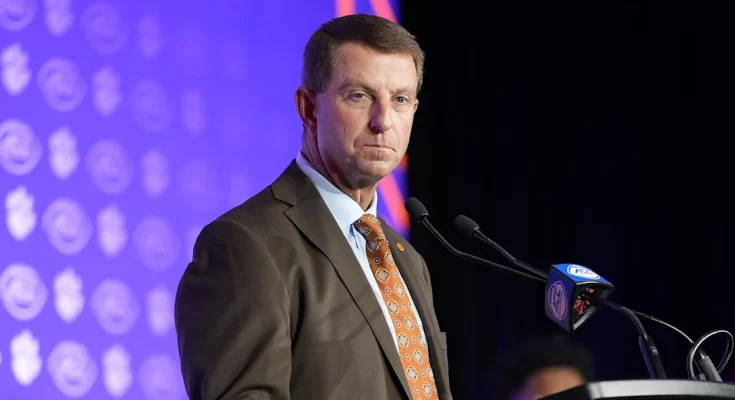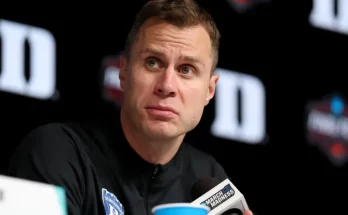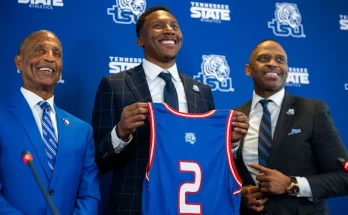There’s a fine line between parody and purpose, and somehow, Dabo Swinney walks it with perfect balance. As the head coach of the Clemson Tigers, Swinney has built a program known not only for its championships but also for its culture—a culture that now eerily mirrors the charm, simplicity, and soul of the fictional English football coach Ted Lasso. The comparisons between Swinney and Lasso, once mere jokes among fans, have now taken on a real identity as the coach doubles down on a philosophy that prioritizes belief, emotional connection, and relentless optimism. Clemson calls it “The Dabo Way,” and it’s far more than a motivational catchphrase. It’s the blueprint for how Swinney leads young men, runs a top-tier college football team, and challenges the traditional conventions of leadership in sports.
What sets Swinney apart is his belief in people over process. Unlike the stereotypical hard-nosed football coach obsessed with numbers, film, and schemes, Swinney’s leadership rests on heart and human connection. Just like Ted Lasso, who won over hearts by caring about his players more than his record, Swinney builds his team by developing relationships first. Whether it’s meeting a recruit’s grandmother in church or hugging a backup kicker after practice, Swinney’s emotional investment in his players is not for show—it’s a central pillar of his approach. And while that sounds like it could lead to chaos or complacency, Clemson’s record under Swinney tells a different story: two national championships, multiple College Football Playoff appearances, and a consistent spot among the nation’s elite programs.
At first glance, Swinney’s personality almost invites mockery. He claps constantly, cracks dad jokes, references scripture often, and peppers his media appearances with infectious energy that feels almost too earnest. But what some see as corniness, others see as clarity. There’s an unmistakable joy in the way he coaches. He’s the guy who throws a pizza party for walk-ons. He cries at Senior Day. He talks about faith and family more than blitz packages and third-down efficiency. In a profession that often celebrates cynicism and machismo, Dabo Swinney’s raw sincerity is a radical act. He’s not trying to be cool—he’s trying to be consistent. And in that consistency, he’s built a culture that has outlasted flash-in-the-pan programs that once seemed destined for dynasties.
The “Dabo Way” begins with belief—belief in the program, belief in the process, but most importantly, belief in people. Like Ted Lasso’s trademark “Believe” sign hanging above the AFC Richmond locker room, Clemson’s version of belief is grounded in a commitment to personal development over transactional coaching. Swinney doesn’t see his players as commodities; he sees them as young men navigating a critical point in life. His program talks constantly about “graduating champions,” a phrase that indicates success is as much about diplomas as it is about rings. That may sound cliché, but the numbers back it up. Clemson’s football team consistently ranks near the top of the APR (Academic Progress Rate) and graduation success rate metrics. Players return to finish degrees even after they’ve gone pro. Former players often come back to mentor or coach, reinforcing the idea that Clemson isn’t a pit stop—it’s a home.
And yet, even the most idealistic system has its challenges. Swinney has faced increased scrutiny in recent years over his resistance to modernizing certain elements of the game. His comments on NIL (Name, Image, and Likeness) and the transfer portal have sparked backlash from fans and pundits who argue he’s falling behind the times. Some claim he clings to a moralistic view of college sports that no longer fits the business-first reality of today’s game. But Swinney hasn’t wavered. Like Ted Lasso, who sticks with his quirky methods even when the media mocks him, Swinney believes his way will still work—if he sticks with it long enough and recruits players who value more than fame and fast money.
The results in recent years haven’t been as dominant as the Trevor Lawrence or Deshaun Watson eras, but the cultural foundation remains intact. While programs like Texas A\&M, USC, or Miami might spend millions trying to buy immediate success through flashy transfers and boosters, Swinney is playing the long game. He’s building leaders, not just athletes. In 2024, when some questioned whether Clemson was losing its elite edge, Swinney responded not with panic but with patience. He leaned even harder into his values, emphasizing personal development, team chemistry, and accountability. It’s a gamble in an era of quick fixes—but it’s also what makes his approach special.
Coaches across the country, both in football and beyond, have quietly started borrowing pages from Swinney’s playbook. Programs at the high school and college levels are putting greater emphasis on culture-building, leadership training, and relationship development. Some have even adopted phrases directly from Swinney’s talks—words like “joy,” “gratitude,” and “discipline with love.” These aren’t buzzwords; they’re the fuel behind the Clemson machine. And in a sports culture often accused of being soulless, “The Dabo Way” stands as a defiant expression of meaning and mission.
Off the field, Swinney’s story only adds to his “Ted Lasso” mystique. Raised in a broken home in Pelham, Alabama, he fought poverty, family instability, and academic obstacles to earn a scholarship at Alabama. He walked on and worked his way into a meaningful role with the Crimson Tide, later becoming a coach after earning his degree. His journey was not linear or glamorous. There were years when he was unemployed, years when he questioned if coaching was even for him. But like Lasso, he stayed rooted in optimism, and eventually, opportunity met preparation when Clemson gave him the head coaching job—first on an interim basis, and then full-time after proving he could lead a fractured locker room.
And he hasn’t looked back since. The players he’s mentored often speak about his impact in fatherly terms. Deshaun Watson once described Swinney as “a coach who builds you up more than he breaks you down.” Hunter Renfrow credits Swinney with giving him belief when few others saw his potential. These aren’t throwaway compliments—they’re reflections of a man whose greatest talent may not be play-calling or recruiting, but relational leadership. Swinney’s emotional intelligence, much like Lasso’s, is his edge. He knows when to challenge, when to comfort, and when to simply listen. That may not show up in analytics or scouting reports, but it wins games—and more importantly, it wins hearts.
It’s no surprise that Clemson’s branding efforts have leaned into this identity. The program’s social media platforms feature behind-the-scenes moments that highlight the human side of the team: dancing in the locker room, community service outings, inspirational speeches from alumni. They know that in an era of highlight reels and viral moments, what truly stands out is authenticity. And in Dabo Swinney, they have a head coach who is unapologetically himself—faithful, funny, and fiercely loyal to his mission.
There are still skeptics, of course. Some say the Ted Lasso comparisons are just fluff. Others question whether Swinney can keep up in a college football landscape that now resembles the NFL in complexity and commercialization. But even if the wins ebb and flow, “The Dabo Way” has already proven something powerful: that leadership with love is not weakness—it’s strength. That building a culture rooted in belief and connection can, in fact, coexist with competitiveness and excellence.
In a world where cynicism often wins the day, Dabo Swinney remains a hopeful anomaly. He’s the guy with a smile on his face, a Bible verse in his hand, and a dream in his heart. He believes in second chances, in late bloomers, in underdogs. He believes that love wins in football, too. And like Ted Lasso walking onto that English pitch for the first time, Swinney keeps reminding us that greatness doesn’t have to come wrapped in anger, arrogance, or ego. Sometimes, all it takes is a little faith—and a whole lot of heart.



